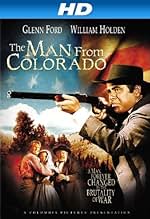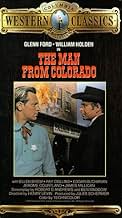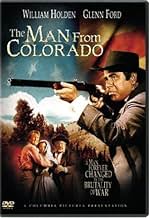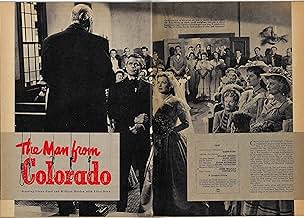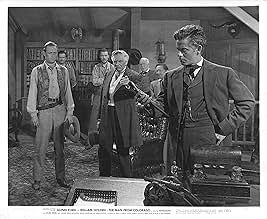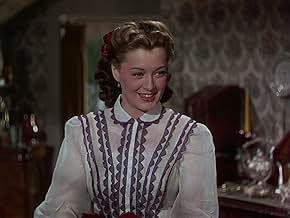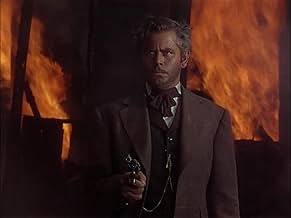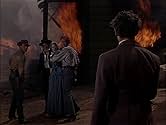AVALIAÇÃO DA IMDb
6,6/10
2,1 mil
SUA AVALIAÇÃO
No final da Guerra Civil, dois amigos regressam a casa no Colorado e um deles mudou e é violento e errático.No final da Guerra Civil, dois amigos regressam a casa no Colorado e um deles mudou e é violento e errático.No final da Guerra Civil, dois amigos regressam a casa no Colorado e um deles mudou e é violento e errático.
- Direção
- Roteiristas
- Artistas
- Prêmios
- 1 indicação no total
William 'Bill' Phillips
- York
- (as Wm. 'Bill' Phillips)
Stanley Andrews
- Roger MacDonald
- (não creditado)
Emile Avery
- Townsman
- (não creditado)
Walter Bacon
- Townsman
- (não creditado)
Walter Baldwin
- Tom Barton
- (não creditado)
Symona Boniface
- Matron
- (não creditado)
Chet Brandenburg
- Party Guest
- (não creditado)
James Bush
- Cpl. Dixon
- (não creditado)
Nora Bush
- Townswoman
- (não creditado)
Boyd Cabeen
- Townsman
- (não creditado)
- Direção
- Roteiristas
- Elenco e equipe completos
- Produção, bilheteria e muito mais no IMDbPro
Avaliações em destaque
"The Man From Colorado", filmed in 1948, portrays two men and how the trauma of the Civil War affected them, and those about them. Glenn Ford delivers a truly mesmerizing performance as a Civil War commander who is slowly being gripped by madness due to the violence of the War, while William Holden plays the part of a veteran of the same war, is able to cope with the aftermath, and yet, is unable to prevent his friend from sinking into degenerate madness.
After the war has ended, both men return to the same hometown to resume their lives. Ford is appointed as a federal judge of the territory, and he, in turn, names Holden as federal marshal. Ultimately, Ford's character sinks deeper into violence and glaring errors in carrying out justice, and Holden has to try and stop his former friend.
Don't let the age of the film deceive you, this movie does pack a message that can be applied today. An 8/10 viewing mark
After the war has ended, both men return to the same hometown to resume their lives. Ford is appointed as a federal judge of the territory, and he, in turn, names Holden as federal marshal. Ultimately, Ford's character sinks deeper into violence and glaring errors in carrying out justice, and Holden has to try and stop his former friend.
Don't let the age of the film deceive you, this movie does pack a message that can be applied today. An 8/10 viewing mark
It begins at the end of the Civil War when a coward massacre takes place , fdealing with two Civil War vets at odds , as two friends return home to Colorado , one an honest marshall (William Holden) , the other a sadistic judge (Glenn Ford) has changed and is now violent and erratic. As two friends go their separate ways after Civil War , one leads an upright life as a sheriff , but the other corrupted by the war engages in a violent campaign to build his own law , and carrying out terrorisation . Colorado's wasn't big enough for both .. when a moan came between them ! .They Turned the West Into a Jungle of Male Killing Male for a Woman!
An odd , old but solid Technicolor Western fare about two friends return home after their discharge from the army after the Civil War , but one of them becomes an erratic , disturbing judge with quirky acting by Glenn Ford , while his friend decently acted by William Holden who desperately tries to find a way to help him. It begins as a sluggish , slow-moving Western with long ball scenes but follows to surprise us with complex characters , thrills , breathtaking patches and decent plot about two different friends ; as both of them end up on opposite sides of the law . The simple tale is almost rudimentary though full of clichés , as the engaging script lines too often settle for crude routine , at times . Suspense and tension builds over the time in which the outlaws and the starring await to take the final confrontation . The action is competently made , as when the nasties shoot and hang without remission and even fire a village . The highlights of the film are the scenes in which the strict judge exects his particular justice by hanging and the final facing off . William Holden provides a slighly laborious acting as new Marshal , but his interpretation is really eclipsed by the great Glenn Ford has had deep-rooted psychological damage due to his experiences during the war, and as his behavior becomes more and more insane . They're well accompanied by a good support cast , such as : Ray Collins , Edgar Buchanan , Jerome Courtland , James Millican, Stanley Andrews , among others .
The motion picture was well directed by Henry Levin . Ex-actor ,director Henry Levin was a previous stage player who had a prolific and long career as filmmaker entering the directing in 1943 about every genre over the next 36 years . His heyday was in the 1960s , when he turned out several bright and frothy sex comedies, notably ¨Belles on their toes , Come fly with me , Honeymoon hotel¨ , his greatest films were on the adventure genre as ¨Genghis Khan , The wonderful world of Brothers Grimm , The bandit of Sherwood Forest , The return of Monte Cristo and Journey to the center of the earth¨ . Although Levin's forte was light comedies, one of his most interesting films was a dark, brooding western ¨Lonely man¨ (1957) and ¨Desperados¨ , both of them with Jack Palance. He finished his career piloting made-for-television movies, and died on the final day of shooting Scout's Honor (1980) (TV). If you are looking for Westerns with action , violence but also story and atmospheric scenes The Man from Colorado(1948) should be for you.
An odd , old but solid Technicolor Western fare about two friends return home after their discharge from the army after the Civil War , but one of them becomes an erratic , disturbing judge with quirky acting by Glenn Ford , while his friend decently acted by William Holden who desperately tries to find a way to help him. It begins as a sluggish , slow-moving Western with long ball scenes but follows to surprise us with complex characters , thrills , breathtaking patches and decent plot about two different friends ; as both of them end up on opposite sides of the law . The simple tale is almost rudimentary though full of clichés , as the engaging script lines too often settle for crude routine , at times . Suspense and tension builds over the time in which the outlaws and the starring await to take the final confrontation . The action is competently made , as when the nasties shoot and hang without remission and even fire a village . The highlights of the film are the scenes in which the strict judge exects his particular justice by hanging and the final facing off . William Holden provides a slighly laborious acting as new Marshal , but his interpretation is really eclipsed by the great Glenn Ford has had deep-rooted psychological damage due to his experiences during the war, and as his behavior becomes more and more insane . They're well accompanied by a good support cast , such as : Ray Collins , Edgar Buchanan , Jerome Courtland , James Millican, Stanley Andrews , among others .
The motion picture was well directed by Henry Levin . Ex-actor ,director Henry Levin was a previous stage player who had a prolific and long career as filmmaker entering the directing in 1943 about every genre over the next 36 years . His heyday was in the 1960s , when he turned out several bright and frothy sex comedies, notably ¨Belles on their toes , Come fly with me , Honeymoon hotel¨ , his greatest films were on the adventure genre as ¨Genghis Khan , The wonderful world of Brothers Grimm , The bandit of Sherwood Forest , The return of Monte Cristo and Journey to the center of the earth¨ . Although Levin's forte was light comedies, one of his most interesting films was a dark, brooding western ¨Lonely man¨ (1957) and ¨Desperados¨ , both of them with Jack Palance. He finished his career piloting made-for-television movies, and died on the final day of shooting Scout's Honor (1980) (TV). If you are looking for Westerns with action , violence but also story and atmospheric scenes The Man from Colorado(1948) should be for you.
Back in the day William Holden and Glenn Ford both had a unique contractual arrangement with Columbia Pictures. When unknown Bill Holden was up for the lead in Golden Boy, Harry Cohn cast him in return for Paramount selling 50% of his services to Columbia. Holden served two studio masters at the time he was making The Man from Colorado and would for another decade.
Glenn Ford was Columbia's bread and butter leading man at the time and right after The Man From Colorado, Cohn sold half of Ford's contract to MGM and Ford also had two studio masters.
What it meant for these two was that all projects had to be cleared through both studios and that Holden and Ford if they did an outside loan out would also have to be cleared from both. Not that their respective studios didn't keep both these guys very busy.
Holden and Ford had done a well received western, Texas, for Columbia back in 1941. Texas was a rather lighthearted film about two cowboys turning to different sides of the law in post Civil War Texas, though it did feature the death of one of them.
The Man from Colorado is also a story about the activities of Union Army war veterans. But The Man from Colorado doesn't have any light moments whatsoever. It's pretty grim tale about one of them developing a real taste for sadism and killing as a result of the war.
Ford's the sadist here, it's one of the few villain parts he ever did and it works I think because he is so against type. He did very few parts like this, Lust for Gold is another, but his public wouldn't accept him in these roles.
Some of the town businessmen led by Ray Collins just look at the war record and decide Ford would make one fine federal judge. A real law and order type. They get a lot more than they bargain for.
In Texas Holden had the showier role of the young cowboy who take the outlaw route. Here however he's the best friend who stands by his former commanding officer even though he both sees the man has issues and Holden loses Ellen Drew to Ford. Holden takes the outlaw path after giving up his marshal's job when Ford starts running roughshod over due process.
The other really standout performance in this film is that of James Milliken who plays one of Ford's former soldiers who turns outlaw and in fact humiliates him in one of the few funny moments in The Man From Colorado. Ford conceives a burning hate for him that results in tragedy all around.
Ford and Holden were considering another joint project in 1981 when Holden died. I would like to have seen that one come to pass.
Try to see The Man From Colorado back to back with Texas.
Glenn Ford was Columbia's bread and butter leading man at the time and right after The Man From Colorado, Cohn sold half of Ford's contract to MGM and Ford also had two studio masters.
What it meant for these two was that all projects had to be cleared through both studios and that Holden and Ford if they did an outside loan out would also have to be cleared from both. Not that their respective studios didn't keep both these guys very busy.
Holden and Ford had done a well received western, Texas, for Columbia back in 1941. Texas was a rather lighthearted film about two cowboys turning to different sides of the law in post Civil War Texas, though it did feature the death of one of them.
The Man from Colorado is also a story about the activities of Union Army war veterans. But The Man from Colorado doesn't have any light moments whatsoever. It's pretty grim tale about one of them developing a real taste for sadism and killing as a result of the war.
Ford's the sadist here, it's one of the few villain parts he ever did and it works I think because he is so against type. He did very few parts like this, Lust for Gold is another, but his public wouldn't accept him in these roles.
Some of the town businessmen led by Ray Collins just look at the war record and decide Ford would make one fine federal judge. A real law and order type. They get a lot more than they bargain for.
In Texas Holden had the showier role of the young cowboy who take the outlaw route. Here however he's the best friend who stands by his former commanding officer even though he both sees the man has issues and Holden loses Ellen Drew to Ford. Holden takes the outlaw path after giving up his marshal's job when Ford starts running roughshod over due process.
The other really standout performance in this film is that of James Milliken who plays one of Ford's former soldiers who turns outlaw and in fact humiliates him in one of the few funny moments in The Man From Colorado. Ford conceives a burning hate for him that results in tragedy all around.
Ford and Holden were considering another joint project in 1981 when Holden died. I would like to have seen that one come to pass.
Try to see The Man From Colorado back to back with Texas.
The story is a fairly simple one. Col. Glenn Ford and Capt. Bill Holden return with a group of fellow soldiers to their home town after the Civil War has ended. Ford has been a pretty ruthless officer. The town has changed during their three-year absence. Their only source of livelihood were their gold claims, but federal laws converted those claims to private property and the mines were gobbled up by Big Ray Collins.
Collins backs Ford for the post of federal judge, and Ford appoints his best friend Holden as chief lawman. The disappointed ex-soldiers bring their case to Judge Ford who finds in favor of Collins. Judge Ford also marries the girl, Ellen Drew, whom Holden also loves. Well, frankly, the ex-soldiers are thoroughly browned off at the loss of their claims even though Big Ray gives them jobs at a barely livable wage ("digging out our own gold") before firing them. Some of the men become bandits preying on Collins' gold. Some don't. But all of them grow to hate Judge Ford for upholding the law, even coming to his house during a birthday party and insulting him in front of his wife and his guest, the friendly doctor, Ed Buchanan. "I don't blame [Collins]," shouts one of the angry crowd, "I blame you!" Ford throws them out.
The plot gets too complicated to describe in any detail but it can be summed up by saying that Judge Ford slugs Holden for telling him he's "sick inside" (people tell Judge Ford that he's "crazy" so often in this movie that it's no wonder he doesn't believe it). His punishments, while within the law, become outrageous. It isn't so much that he's on the side of Big Ray and the suits. It's that he's on his own trip. The movie ends happily, more or less, with Ford gone and Big Ray destroyed, and Holden riding off to Washington to see that the ex-soldiers and the rest of the town get their just due. He smiles at Allen as he boards the train and tells her, "I'll be back."
It's been pointed out repeatedly that "adult westerns" -- that is, those appearing after everybody started watching cheap Hopalong Cassidy movies on TV -- are a chronicle of their times. {"High Noon" is the most often cited example, although nobody seems quite sure of exactly which point of view the film took.) "The Man from Colorado" is no exception. Released in 1948, it's full of references to war veterans and the problems they experience after returning to their home towns. And Glenn Ford has clearly been twisted by his wartime experiences, as have some character in other late- or post-war movies -- William Bendix in "The Blue Dahlia" or whatever it's called, who keeps hearing "monkey music" in his head, or John Garfield in "Pride of the Marines," or Brian Keith in "Five Against the House," I think it was.
The topical references are the most interesting part of the movie, but they are grafted onto an otherwise routine plot. The movie is overorchestrated. If the characters sang their lines it would be grand opera. The wardrobe is undistinguished. The settings are cheesy. When an unjustly accused young veteran is lying against the wall of his jail cell, it looks like what it is: a plaster wall with bricks painted on it. But Makeup should get a medal. Glenn Ford has worn various dos during his career, from bookeeper to flat-top but nothing like this pompador.
Watch it if nothing else is on.
Collins backs Ford for the post of federal judge, and Ford appoints his best friend Holden as chief lawman. The disappointed ex-soldiers bring their case to Judge Ford who finds in favor of Collins. Judge Ford also marries the girl, Ellen Drew, whom Holden also loves. Well, frankly, the ex-soldiers are thoroughly browned off at the loss of their claims even though Big Ray gives them jobs at a barely livable wage ("digging out our own gold") before firing them. Some of the men become bandits preying on Collins' gold. Some don't. But all of them grow to hate Judge Ford for upholding the law, even coming to his house during a birthday party and insulting him in front of his wife and his guest, the friendly doctor, Ed Buchanan. "I don't blame [Collins]," shouts one of the angry crowd, "I blame you!" Ford throws them out.
The plot gets too complicated to describe in any detail but it can be summed up by saying that Judge Ford slugs Holden for telling him he's "sick inside" (people tell Judge Ford that he's "crazy" so often in this movie that it's no wonder he doesn't believe it). His punishments, while within the law, become outrageous. It isn't so much that he's on the side of Big Ray and the suits. It's that he's on his own trip. The movie ends happily, more or less, with Ford gone and Big Ray destroyed, and Holden riding off to Washington to see that the ex-soldiers and the rest of the town get their just due. He smiles at Allen as he boards the train and tells her, "I'll be back."
It's been pointed out repeatedly that "adult westerns" -- that is, those appearing after everybody started watching cheap Hopalong Cassidy movies on TV -- are a chronicle of their times. {"High Noon" is the most often cited example, although nobody seems quite sure of exactly which point of view the film took.) "The Man from Colorado" is no exception. Released in 1948, it's full of references to war veterans and the problems they experience after returning to their home towns. And Glenn Ford has clearly been twisted by his wartime experiences, as have some character in other late- or post-war movies -- William Bendix in "The Blue Dahlia" or whatever it's called, who keeps hearing "monkey music" in his head, or John Garfield in "Pride of the Marines," or Brian Keith in "Five Against the House," I think it was.
The topical references are the most interesting part of the movie, but they are grafted onto an otherwise routine plot. The movie is overorchestrated. If the characters sang their lines it would be grand opera. The wardrobe is undistinguished. The settings are cheesy. When an unjustly accused young veteran is lying against the wall of his jail cell, it looks like what it is: a plaster wall with bricks painted on it. But Makeup should get a medal. Glenn Ford has worn various dos during his career, from bookeeper to flat-top but nothing like this pompador.
Watch it if nothing else is on.
Glenn Ford was as good as anyone playing an intense psychotic, which he does here in this above-average western. Ford, playing "Col.Owen Devereaux," gets elected to the position of "judge" right after his distinguished career in the Civil War. Unfortunately, he has mental problems and this position carries too much weight for an unstable sort such as him to be carrying. His best buddy, "Capt. Del Stewart" (William Holden) sees his friend as he is and tries to reason with him and help him out but winds up being alienated, too, by the paranoid judge whose problems escalate as the story goes on.
There's not a tremendous amount of action in here, but it still moves pretty fast and looks really nice on DVD. This is one of the few color films of the 1940s.
Ellen Drew, Ray Collins and Ed Buchnan provide good supporting help in the story. If you like some of the Anthony Mann-James Stewart westerns of the late '40s/early '50s, you should like this one, too.
There's not a tremendous amount of action in here, but it still moves pretty fast and looks really nice on DVD. This is one of the few color films of the 1940s.
Ellen Drew, Ray Collins and Ed Buchnan provide good supporting help in the story. If you like some of the Anthony Mann-James Stewart westerns of the late '40s/early '50s, you should like this one, too.
Você sabia?
- CuriosidadesColumbia Pictures spent quite a bit on The Man in Colorado. At one point, the crew dynamited the side of a 1500-foot mountain in California's San Fernando Valley in order to create a deep gorge as called for by the script. And the western town they constructed was one of the largest location sets ever built by Columbia up to that time. During filming of a massive fire scene at the end, however, the set caught fire uncontrollably, and Holden and Ford tried to actually fight the fire until firemen could arrive. "Dad came away coated in black soot, with burns to his arms and hands," Ford's son Peter later wrote.
- Erros de gravaçãoMany of the men are wearing trousers with belt loops and belts. Belt loops were not added to men's trousers until the 20th century.
- Citações
Owen Devereaux: [voiceover as he writes in his diary] I killed a hundred men today. I didn't want to. I couldn't help myself. What's wrong with me? I'm afraid... afraid I'm going crazy.
- Cenas durante ou pós-créditosOpening credits are listed in the pages of a book being turned by a hand.
- ConexõesFeatured in Nobre Inimigo (1952)
- Trilhas sonorasWhen Johnny Comes Marching Home
(uncredited)
Written by Louis Lambert (pseudonym for Patrick Sarsfield Gilmore)
Played at the homecoming
Principais escolhas
Faça login para avaliar e ver a lista de recomendações personalizadas
- How long is The Man from Colorado?Fornecido pela Alexa
Detalhes
- Data de lançamento
- País de origem
- Idioma
- Também conhecido como
- The Man from Colorado
- Locações de filme
- Empresa de produção
- Consulte mais créditos da empresa na IMDbPro
Bilheteria
- Orçamento
- US$ 1.000.000 (estimativa)
- Tempo de duração
- 1 h 40 min(100 min)
- Cor
- Proporção
- 1.37 : 1
Contribua para esta página
Sugerir uma alteração ou adicionar conteúdo ausente


